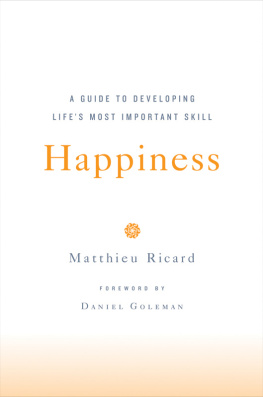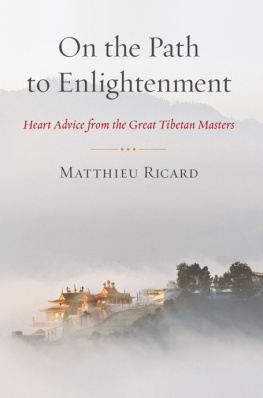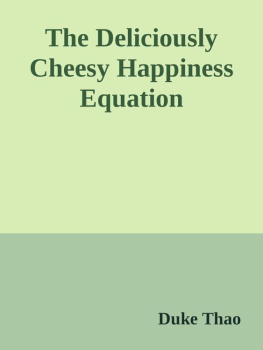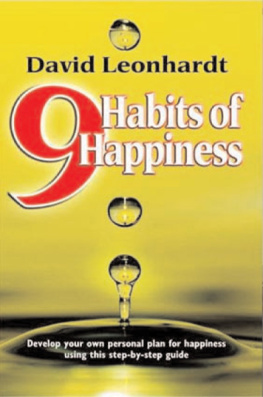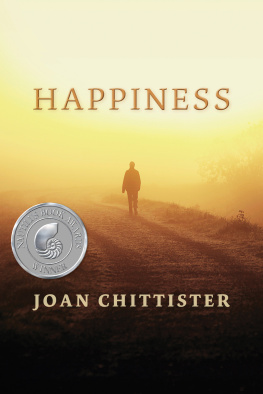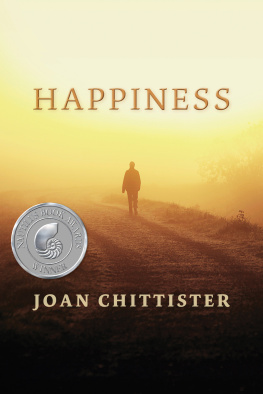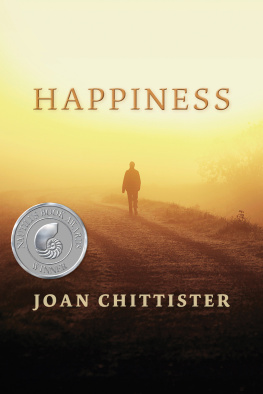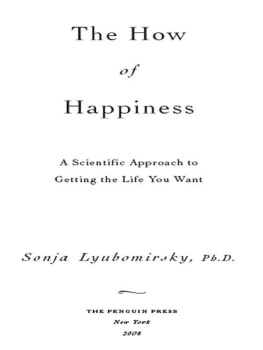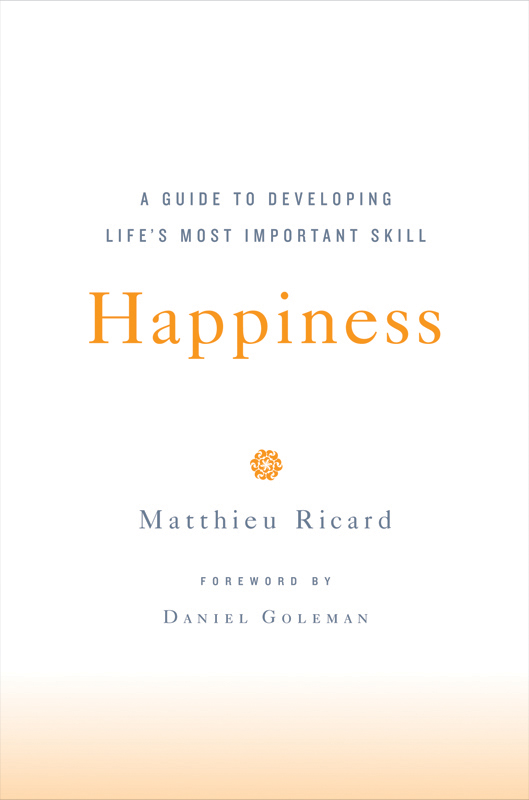Copyright 2003, NiL ditions, Paris
Translation copyright 2006 by Jesse Browner
All rights reserved. No part of this book may be reproduced in any form or by any electronic or mechanical means, including information storage and retrieval systems, without permission in writing from the publisher, except by a reviewer who may quote brief passages in a review.
Little, Brown and Company
Hachette Book Group, 237 Park Avenue, New York, NY 10017
Visit our Web site at www.HachetteBookGroup.com
The Warner Books name and logo are trademarks of Hachette Book Group, Inc.
First eBook Edition: December 2008
ISBN: 978-0-316-05475-1
Book design by Renato Stanisic
On HAPPINESS
The readers of this book will find themselves in the presence of an extraordinary human being, one who is equally at home in the culture and science of the West and in the poetry and wisdom of Tibetan Buddhism, and who has made a clear choice. Ricards compelling personal story beautifully illustrates his message that happiness is to be found in controlling the mind, not circumstances.
Daniel Kahneman, Princeton University, winner of a Nobel Prize in Economics, 2002
You may not find happiness in a book, but if reading a book can precipitate a tectonic shift in your life and mind toward robust, genuine, deeply rooted happiness, this would be the book.
Jon Kabat-Zinn, author of Coming to Our Senses
In this highly readable and enlightening volume, Matthieu Ricard offers us the keys to opening up the chambers of the mind where serenity resides. His elegant descriptions show us how the preoccupation with the self leads to the detrimental urges, thoughts, and feelings that present barriers to genuine liberation.
Aaron Beck, MD, author of Cognitive Therapy and the Emotional Disorders
Writing with grace and clarity, Ricard offers exciting ideas and practical tools for increasing our understanding of ourselves and our relationship to the world.
Paul Ekman, PhD, author of Emotions Revealed
In his new book Happiness Matthieu Ricard combines the talents of philosopher and scientist to produce a rigorous and compelling analysis of his subject. He reminds us that to change the individual is also, ultimately, to change the world.
George Soros
The Monk and the Philosopher (with Jean-Franois Revel)
The Quantum and the Lotus (with Trinh Xuan Thuan)
Buddhist Himalayas (with Olivier and Danielle Fllmi)
Journey to Enlightenment
Monk Dancers of Tibet
Tibet: A Compassionate Eye
To Jigme Khyentse Rinpoche
T he first time I met Matthieu Ricard he was huddled over a computer monitor in a back room of Shechen Monastery in Kathmandu, Nepal. Matthieu was overseeing a group of monks who were laboriously copying texts word by word from the traditional long rectangles of woodblock-printed pages, typing them into a computer program with a specially designed Tibetan font.
What had been tall stacks of yellowing handmade paper between hand-carved covers was now stored digitally, in an electronic space the size of the palm of a hand. The digital age had entered the monastery. Now anyone with computer access could tap into texts that for centuries had only been found stored away in hermitages and monasteries in the high, hidden valleys of Tibet. Matthieu was helping to preserve for the modern world wisdom from the ancient.
Matthieu seems the perfect candidate for that task. His background includes one of the finest educations the modern world can offer. He holds a doctorate in biology from the prestigious Pasteur Institute, where his main adviser was a Nobel laureate. And yet he has spent more than a quarter century as a Buddhist monk in the Himalayas, learning from some of the most fully realized Tibetan teachers of our day.
More recently Ive worked with Matthieu as part of the Mind and Life Institute, which brings scientists together in dialogue with Buddhist scholars. That ongoing conversation has resulted in remarkable findings that show how meditation can reshape the brain, strengthening the centers that undergird good feelings and compassion.
Here Matthieu speaks with unparalleled authority. I witnessed him work in collaboration with Professor Richard J. Davidson, head of the Laboratory for Affective Neuroscience at the University of Wisconsin-Madison, as they prepared to pilot a series of brain tests that would be used with advanced meditators. Matthieu was both a key collaborator in considering what measures would make the most sense, and the first experimental subject.
For the first tests, Matthieu lay within the noisy maws of a magnetic resonance imager (MRI), the diagnostic imaging device that uses huge magnets that whirl around a persons body as he or she lies within the machine. The MRI offers a precise image of a persons brain (or other internal tissues), but it is also an ordeal for many people, some of whom panic at being trapped inside the monstrous machine. Matthieu endured his captivity for more than three hours while going through the paces of several kinds of meditation: concentration, visualization, and compassion.
At the end of that grueling session, we rushed into the room to see how Matthieu had held up, slightly apprehensive about the effects of his ordeal. But Matthieu emerged from the machine smiling. His comment: That was like a miniretreat!
That reaction to what most people would find overwhelming bespeaks a special state of mind, a capacity for confronting lifes ups and downs with equanimity, even joy. And Matthieu, I realize, has that joie de vivre in full measure.
The psychoanalyst C. G. Jung once described the role of a Gnostic intermediary as someone who himself plunges into spiritual depths and emerges to bring the vision of that inner possibility to the rest of us. Matthieu fills that role.
Beyond his well-cultivated temperament, Matthieu brings a quiet brilliance and always quick mind. Ive witnessed him in sessions of the Mind and Life meetings, where the Dalai Lama explores in depth a scientific topic with a panel of scientific experts. Matthieu often represents the Buddhist perspective, speaking with a fluid intelligence that easily weaves together spiritual and scientific paradigms.
In Happiness he draws on both his ease in the world of scientific studies and philosophy and his intimate familiarity with the wisdom traditions of Buddhism, bringing these streams together in a seamless offering. The resulting insights are both inspiring and pragmatic. The vision of happiness conjured here challenges our everyday notions of joy, making a convincing argument for contentment over collecting good times, for altruism over self-centered satiation. And beyond that, Matthieu suggests how we can all cultivate the very capacity for such happiness.
On the other hand, Matthieu offers no quick fixes, for he knows well that training the mind takes effort and time. Instead he goes to the root of the mechanisms that underlie suffering and happiness, offering refreshing insights into how the mind functions and strategies for dealing with our most difficult emotions. The result is a sound road map, one based on cultivating the conditions for genuine well-being.
A few days after my wife and I first met Matthieu, we happened to share some hours together in the Kathmandu airport, waiting for endlessly delayed flights. Those hours sped by in minutes due to the sheer pleasure of being in Matthieus orbit. He is without doubt one of the happiest people I knowand happiness is contagious. I wish the reader a similar contagion, enjoying the pleasures to be found in these pages.

